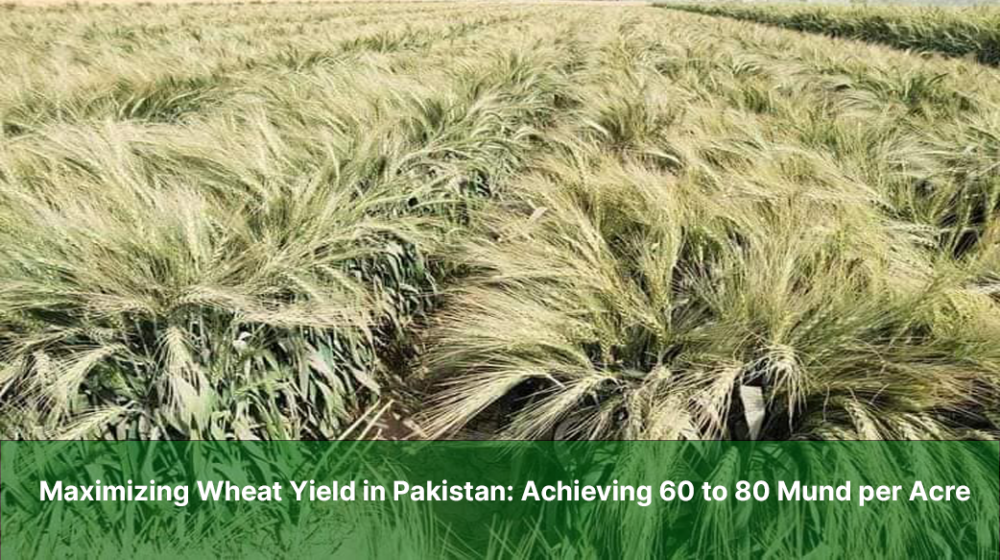Maximizing Wheat Yield in Pakistan: Achieving 60 to 80 Mund per Acre
Elevate your wheat yields to new heights with this comprehensive guide tailored for Pakistani farmers. Discover proven agronomic practices, select high-yielding seed varieties, and implement effective resource management strategies to achieve wheat yields of 60 to 80 mund per acre. Embark on a journey of enhanced productivity, improved food security, and agricultural success in Pakistan.
Wheat is a staple crop in Pakistan, accounting for nearly 30% of the country’s total agricultural production. However, average wheat yields in Pakistan are significantly lower than the global average. This can be attributed to various factors, including limited access to improved seed varieties, inadequate irrigation facilities, and inefficient fertilization practices.
Achieving 60 to 80 Mund per Acre
Increasing wheat yields to 60 to 80 mund per acre requires a comprehensive approach that focuses on improved agronomic practices, utilization of high-yielding seed varieties, and effective resource management.
1. Improved Agronomic Practices
- Land Preparation: Proper land preparation is essential for ensuring optimal soil conditions for wheat growth. This involves deep plowing, leveling, and harrowing to create a loose and well-drained soil structure.
- Seedbed Preparation: A fine and firm seedbed is crucial for uniform germination and seedling emergence. This can be achieved by using a seedbed cultivator or roller.
- Seed Selection: Choosing the right seed variety is paramount for maximizing wheat yield. High-yielding varieties, such as PARI, SHAKARGAAND, and FASAL, should be selected based on their adaptability to local climatic conditions and disease resistance.
- Seed Rate: The optimal seed rate depends on the variety, soil type, and sowing time. Generally, a seed rate of 100 to 120 kg per hectare is recommended for irrigated conditions.
- Sowing Time: Timely sowing is crucial for maximizing wheat yields. Early sowing (November-December) is generally recommended for irrigated conditions, while late sowing (January-February) may be suitable for rain-fed conditions.
- Fertilizer Management: Balanced fertilization is essential for providing wheat plants with the nutrients they need for optimal growth and yield. A recommended fertilizer application schedule is as follows:
- Basal Application: Apply Di-Ammonium Phosphate (DAP) at 50 kg per hectare at sowing time.
- First Irrigation: Apply Urea at 50 to 60 kg per hectare at the first irrigation.
- Second Irrigation: Apply Urea at 50 to 60 kg per hectare at the second irrigation.
- Irrigation Management: Efficient irrigation is crucial for maintaining adequate soil moisture, particularly during critical growth stages. Apply water at regular intervals, ensuring that the soil does not dry out completely between irrigations.
- Weed Control: Timely weed control is essential for preventing competition with wheat plants for nutrients, water, and sunlight. Herbicides can be used effectively to control weeds.
- Disease and Insect Control: Regular monitoring and timely control of diseases and insects are essential for protecting wheat crops from yield losses. Use appropriate pesticides and fungicides as needed.
2. Best Yielding Wheat Seed Varieties in Pakistan
Several high-yielding wheat varieties are available in Pakistan. Some of the most popular and recommended varieties include:
- PARI-80: A high-yielding variety with excellent adaptability to diverse climatic conditions.
- SHAKARGAAND-1: A variety with high yield potential and resistance to rust and powdery mildew.
- FASAL-139: A variety with excellent adaptability to rainfed conditions and resistance to drought and heat stress.
- GH-11: A variety with high yield potential and resistance to yellow rust.
- SAHAR-06: A variety with high yield potential and resistance to lodging.
3. Government Wheat Seed Varieties in Pakistan
The Government of Pakistan plays a significant role in promoting improved wheat varieties through its research and development institutions. Several government-approved wheat varieties are available at subsidized rates to farmers. These varieties include:
- Inqilab-91: A high-yielding variety with resistance to rust and powdery mildew.
- Chakwal-50: A variety with high yield potential and adaptability to rainfed conditions.
- SARC-2: A variety with excellent adaptability to saline soils.
Achieving wheat yields of 60 to 80 mund per acre in Pakistan requires a combination of improved agronomic practices, utilization of high-yielding seed varieties, and effective resource management. By adopting these practices, farmers can significantly enhance their wheat production and contribute to the nation’s food security goals.
